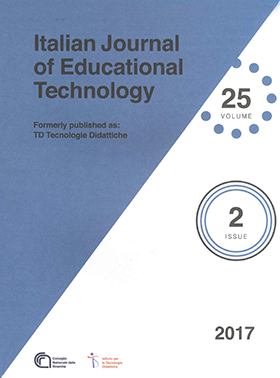Influenza del pensiero computazionale nella ricerca e nell’educazione per tutti
Contenuto principale dell'articolo
Abstract
Dettagli dell'articolo
Sezione
Gli autori che pubblicano su questa rivista accettano le seguenti condizioni:
- Gli autori mantengono i diritti sulla loro opera e cedono alla rivista il diritto di prima pubblicazione dell'opera, contemporaneamente licenziata sotto una Licenza Creative Commons CC BY 4.0 Attribution 4.0 International License.
- Gli autori possono aderire ad altri accordi di licenza non esclusiva per la distribuzione della versione dell'opera pubblicata (es. depositarla in un archivio istituzionale o pubblicarla in una monografia), a patto di indicare che la prima pubblicazione è avvenuta su questa rivista.
- Gli autori possono diffondere la loro opera online (es. in repository istituzionali o nel loro sito web) prima e durante il processo di submission, poiché può portare a scambi produttivi e aumentare le citazioni dell'opera pubblicata (Vedi The effect of Open Access).
Riferimenti bibliografici
Aho, A. V., & Ullman, J. D. (1992). Foundations of computer science. Rockville, MD: Computer Science Press. Retrieved from http://infolab.stanford.edu/~ullman/focs.html
Annear, S. (2015, November 17). Yale’s most popular course is a Harvard class. Boston Globe. Retrieved from https://www.bostonglobe.com/metro/2015/11/17/yale-most-popular-course-harvard-class/OsJs36GYID8tViXKDUEaqM/story.html
Bell, T., Witten I., & Fellows, M. (2015). Computer Science Unplugged. Retrieved from http://csunplugged.org/wp-content/uploads/2015/03/CSUnplugged_OS_2015_v3.1.pdf
Bryant, R. E., Sutner, K., & Stehlik, M. J. (2010). Introductory computer science education at Carnegie Mellon University: A deans’ perspective. Pittsburgh, PA: Carnegie Mellon University. Retrieved from http://repository.cmu.edu/compsci/2554/
Denning, P. J. (2010). The great principles of computing. American Scientist, 98, 369-372. Retrieved from https://www.americanscientist.org/libraries/documents/20108101750328103-2010-09denning-computingscience.pdf
Farrell, M. B. (2013, November 16). Computer science fills seats, needs at Harvard. Boston Globe. Retrieved from http://www.bostonglobe.com/business/2013/11/26/computer-science-course-breaksstereotypes-and-fills-halls-harvard/7XAXko7O392DiO1nAhp7dL/story.html
Grimson, E., & Guttag, J. (2008). 6.00 Introduction to Computer Science and Programming, Fall 2008 [Course]. Retrieved from https://ocw.mit.edu/courses/electrical-engineering-and-computer-science/6-00-introduction-to-computer-science-and-programming-fall-2008/
Guttag, J. V. (2016). Introduction to computation and programming using Python with application to understanding data, Second Edition. Cambridge, MA: MIT Press.
Hey, T., & Papay, G. (2014). The computing universe. Cambridge, UK: Cambridge University Press.
Klawe, M. (2013, December 18). Increasing the participation of women in computing careers [Blog post]. Retrieved from http://socialissues.cs.toronto.edu/2013/12/women/
Levin, L. A. (2013). Universal heuristics: How do humans solve “unsolvable” problems?. In D. L. Dowe (Ed.), Algorithmic probability and friends. Bayesian prediction and artificial intelligence (pp. 53-54). Berlin, DE: Springer.
National Research Council (2005). Catalyzing inquiry at the interface of computing and biology. Washington, DC: The National Academies Press. doi:10.17226/11480
National Research Council (2009). A new biology for the 21st century. Washington, DC: The National Academies Press. doi:10.17226/12764
National Research Council (2010). Report of a workshop on the scope and nature of computational thinking. Washington, DC: The National Academies Press. doi:10.17226/12840
National Research Council (2011). Report of a workshop on pedagogical aspects of computational thinking. Washington, DC: The National Academies Press. doi:10.17226/13170
President’s Information Technology Advisory Council (2005). Computational science: Ensuring America’s competitiveness. Washington, DC. Retrieved from http://www.dtic.mil/docs/citations/ADA462840
The Danish Growth Council (2016). Report on qualified labour. Copenhagen, DK. Retrieved from http://danmarksvaekstraad.dk/file/634221/Rapport_om_kvalificeret_arbejdskraft.pdf
UK Department for Education (2013). Computing programmes of study for Key Stages 1-4. Retrieved from http://media.education.gov.uk/assets/files/pdf/c/computing%2004-02-13_001.pdf
Wing, J. M. (2006). Computational thinking. Communications of the ACM, 49(3), 33-35. doi:10.1145/1118178.1118215
Wing, J. M. (2008). Five deep questions in computing. Communications of the ACM, 51(1), 58-60. doi:10.1145/1327452.1327479
Wing, J. M. (2011, March 06). Computational thinking: What and why. The Link. Retrieved from http://www.cs.cmu.edu/link/research-notebook-computational-thinking-what-and-why

